Plasmodium Falciparum: Morphology, Life Cycle and Health Impact
Malaria is one of the most prevalent infectious diseases worldwide. Severe malaria leads to the death of close to two million individuals every year. Plasmodium falciparum, the causative agent of the most severe form of malaria is becoming increasingly resistant to current drugs, including artemisinin. This book presents current advances and comprehensive material in the biology of the parasite responsible for the most enduring and devastating disease of mankind. This book addresses P. falciparum infection and severe malaria, the role of heat shock proteins in the development and pathogenicity of the parasite, the biosynthesis of isoprenoid, specifically the methylerythritol phosphate (MEP) pathway in the erythrocytic stages of the parasite is described.
{{comment.content}}








 京公网安备 11010802027623号
京公网安备 11010802027623号